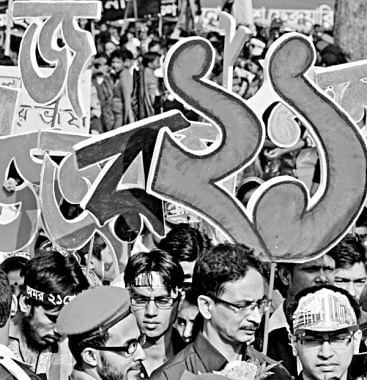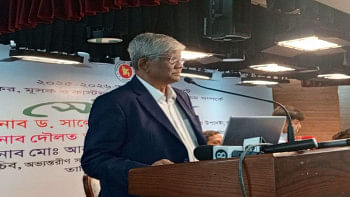Ekushey had to happen . . .
Let this be our first point of agreement. Ekushey was the earliest intimation of a rising Bengali nationalism in the state of Pakistan. And that was as it should have been, seeing that by going along with the All-India Muslim League in its programme of the creation of Pakistan, the people of Bangladesh may have committed one of those major historical blunders which condemn societies to darkness for a very long time. Bengal had always been a metaphor for secular politics, until Lord Curzon, in association with the Dhaka Nawab family that knew no Bengali and therefore was blissfully ignorant of Bengali culture, sliced through the land in 1905. That partition proved to be unsustainable, for all the right reasons.
But then came 1947, when neighbours --- Bengali Muslims and Hindus --- turned on one another with a ferocity the likes of which had never before been experienced. The precursor, of course, was the Direct Action Day in 1946, when a Muslim prime minister of a yet united Bengal simply mutated into a partisan politician and set off a conflagration that would leave at least 5,000 Hindus and Muslims in four days of intense violence. But then again, this same politician, Huseyn Shaheed Suhrawardy, in association with Sarat Chandra Bose, hit upon the notion --- and that on the eve of partition --- that Bengal could remain intact as a sovereign state even as free India and Pakistan came into shape. That was absurd, for a united, independent Bengal would leave its 44 per cent Hindus at the mercy of its 56 per cent Muslims. And do not forget that Suhrawardy was one of the foremost votaries of the Pakistan idea. Bengali Hindus were wary of him, after August 1946. It was a sentiment loudly expressed by Shyama Prasad Mukherjee. Bengal went through the knife again, with its east becoming part of a communal dispensation and its west opting for a secular India.
But then, as they say, Bengalis will always be Bengalis, with their passion for poetry and frenzied pursuit of politics. It was a character trait neither Mohammad Ali Jinnah nor his Urdu and Punjabi-speaking acolytes had taken note of. Besides, Jinnah’s ego was what inflamed the Bengalis of the state he had created out of British India. Surprisingly for a man of such legal perspicuity and political astuteness, his understanding of Bengali history and culture was poor. In March 1948, only hours after telling his audience at Curzon Hall (note how Curzon keeps coming back) that Urdu would be the lingua franca of Pakistan, he indignantly asked a Dhaka University students delegation if Bengal could cite any great men of letters or politics in its history. Irreverence was in the air as the young men rattled off a number of names, to which Jinnah had no response, save his feeling that these young certainly did not know how to respect their elders. Jinnah would not budge; and the students would not give ground. Pakistan faced a big question mark.
It was a diminished Jinnah who took leave of life in September 1948. It was a political pigmy, in the person of Khwaja Nazimuddin, who succeeded him and immediately went throwing his weight around. Echoing Jinnah, he warned Bengalis that they would have to live with Urdu. It was behavior that left even Chief Minister Nurul Amin and Chief Secretary Aziz Ahmed embarrassed. Nazimuddin’s ancestor Salimullah had pushed Bengal to partition in 1905; and now Nazimuddin was doing all he could, without realizing it of course, to push Bengalis into a confrontation with the state of Pakistan. The confrontation came, in February 1952. Something went out of Pakistan, something of fire came into the Bengali soul. That the Bengalis were a nation, despite nearly half of them considering themselves part of India, was the idea thrown up by Ekushey. Linguistic nationalism, a rarity in the history of the world, sprouted in the fecundity of East Bengal.
When you think back on the language question, you are quite stupefied by the ignorance or arrogance or both that underlined the attitude of the ruling Muslim League leadership towards Bengalis. Liaquat Ali Khan and Abdur Rab Nishtar had little time to sit back and reflect on the ramifications of a rejection of the Bengali demand. Men like Dhirendranath Dutta and Bhupendra Kumar Datta, courageous to the marrow of their bones, pointed to the writing on the wall if the Bengali language was brushed aside. But they refused to read that writing. Isn’t it quite intriguing that the first few individuals to raise the demand for Bengali were Bengali Hindus? If you go through the proceedings of the Pakistan constituent assembly session of 25 February 1948 --- and that was less than a month before Jinnah travelled to Dhaka --- you will wonder why no Bengali Muslim rose in the House to defend their Hindu compatriots. Because they were beholden to Jinnah and Liaquat for their places in the sun? Or were they in the process of embracing a new, faux Pakistani nationalism to the exclusion of their Bengali heritage? Do not forget that Bengalis like Fazlur Rahman were always around to undermine their own language. Rahman had the audacity to suggest that Bengali be written in the Arabic script, an instance of silliness that naturally brought him much justifiable opprobrium. Men like Jinnah, Liaquat, Fazlur Rahman and a whole legion of others kept looking for Islam in some of the unlikeliest of places, and they spotted it in Urdu. Now, Urdu is a most melodious language, one that gives us the profundity of ghazals and teaches us an aristocracy of behavior. None of its votaries --- Ghalib, Zauq, Mir Taqi Mir et al --- ever suggested that it was the language of Muslims. But these purveyors of Pakistan thought they had chanced upon a huge discovery. What they did not discover was their own vulnerability before those passionate Bengalis.
Which is why Ekushey had to happen. And yet Ekushey did not lead to any perceptible change of heart among Pakistan’s political classes. Without the slightest of qualms, they dismissed the Jukto Front ministry in East Bengal only two years later. Without any thought to the consequences, they brought in the absurdity of population parity between the two wings of Pakistan into the 1956 constitution. Without any embarrassment, the army took over in 1958, effectively scuttling any chances of a general election in early 1959. Without a basic understanding of politics, the state of Pakistan went after the Six Points. And without any fear that its action in East Pakistan would jeopardize the future of Pakistan, the army happily went around murdering three million Bengalis. Pakistan bled to death in Bangladesh.
And Bengali nationalism, tracing its roots to Ekushey 1952, asserted itself. Quite natural, quite understandable.
The writer is Executive Editor, The Daily Star


 For all latest news, follow The Daily Star's Google News channel.
For all latest news, follow The Daily Star's Google News channel. 



Comments